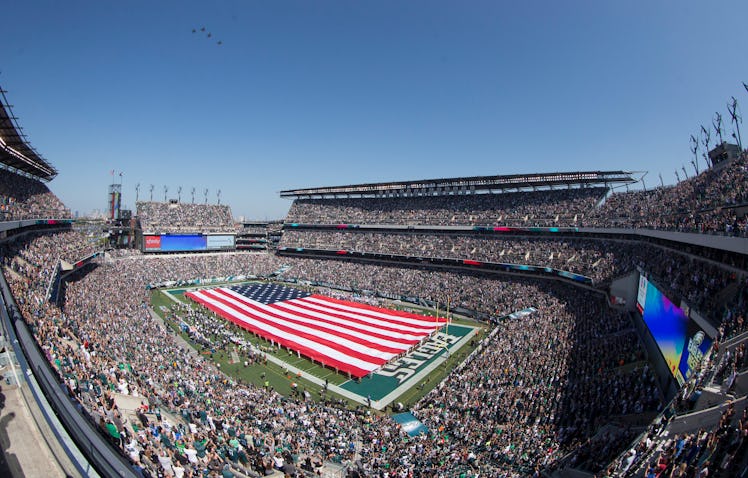
Fewer People Are Proud To Be Americans, Poll Shows & The Numbers Are Telling
The Fourth of July is just a couple of days away, and now is usually the time you'd expect every store within a 50-mile radius to run out of plastic cups and red-white-and-blue napkins. But don't be surprised if this year brings less celebration than usual. A new Gallup poll shows that Americans are less patriotic than in previous years.
Overall, the Gallup poll shows a record low percentage of Americans who identified themselves as "extremely proud" of their nationality, coming in at 47 percent, compared with 51 percent in 2017. This is lower than at any other time in the 18 years since the group has conducted the poll.
The highest the country has seen this number in the last two decades was in 2003, when the "extremely proud" percentage hit 70. Since then, the percentage of people who responded this way has steadily declined since. Gallup's 2018 poll was conducted between June 1 and 13, and surveyed 1,520 Americans.
Notably, over the last five years, the percentage of Americans who said they were "extremely proud" has declined significantly. In that period, every subgroup has seen their numbers go down in the area, but it's been most drastic among women, 18-to-49-year-olds; nonwhites; and the college educated. In the last year, men were the only subgroup to not see a decline in "extremely proud" Americans. (As CNN notes, an MTV poll from May also found that younger generations feel the label "patriotic" applies more to their parents' generation than to them.)
The trend has continued since President Donald Trump took office. "The decline preceded the election of Donald Trump but has accelerated in the past year," reads the report.
The level of reported pride among Americans also varies greatly by their political party. The poll shows that, while only 32 percent of Democrats are "extremely proud," a whopping 74 percent of Republicans are, the highest that number has been in years. Gallup notes this partisan divide is consistent throughout history, and persisted throughout the Obama administration. But what's most shocking is that the divide itself has nearly tripled in the last five years, going from a 15-percent gap in 2013 to a 42-percent gap in 2018.
That Republicans are experiencing their proudest moment in the last two decades is understandable in some ways. Currently, Republicans hold majority rule in both houses of Congress and in the White House. And following the retirement of Supreme Court Justice Anthony Kennedy last week, whose successor will presumably be conservative, Republicans continue to enjoy a stronghold on the country's decision-making power.
The poll's disparity among party respondents was consistent with the findings of USA Today/Ipsos poll, also published July 2. While this poll found that the majority of respondents were proud to be American, though not necessarily proud of the country, the gap was significant among Republicans, Democrats, and Independents. The poll, conducted June 26-27, surveyed just over 1,000 Americans.
Trump's approval ratings have also seen some remarkably figures. Just last week, the president touted his ratings in the polls, though it's unclear what it was he was bragging about. As of writing, FiveThirtyEight's composite poll shows him with a 41.9 percent approval rating and a 52.1 percent disapproval rating. (He's claimed in the the past that polls are off by a substantial number of percentage points, but there's no reason to suggest that's the case.) With a net negative approval rating consistent during his tenure in office thus far, ranking as the most unpopular president in modern history, examining Trump's ratings by state also shows how entire chunks of the country have flipped from overall positive to negative.
It's unclear whether the polls' findings, released amidst a wave of state primaries, reflect on how the country plans to vote in the upcoming midterm elections in November. But it's certainly not the most inspiring news about the country's patriotism just in time for Independence Day.